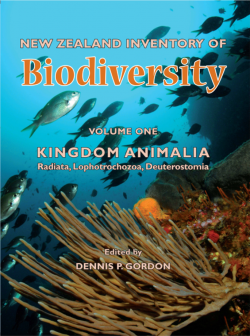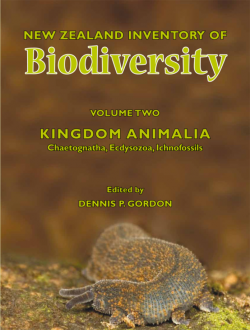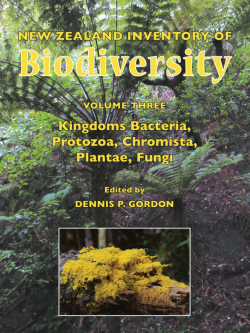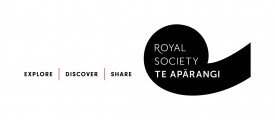New Zealand Inventory of Biodiversity
New Zealand Inventory of Biodiversity volumes now available at reduced price
Canterbury University Press is reducing stock. Consequently, they have lowered the price for the three volumes of the 2009-2012 New Zealand Inventory of Biodiversity edited by Dennis Gordon (NIWA).
The set of all three volumes has been reduced from $180 to $70
1792 pages, set of 3 hardback books280 x 210 mm, 96 pages of colour illustrations, black and white photos and illustrations throughout.
ISBN 978-1-927145-28-9
Individual volumes are now only $35
Volume One. Kingdom Animalia: Radiata, Lophotrochozoa, Deuterostomia. Canterbury University Press, Christchurch. 568 pages. 2009.
Fossil groups included: Sponges, corals, molluscs, brachiopods, bryozoans, tubeworms, echinoderms, graptolites, vertebrates.
Buy Volume 1 using the link below
Volume Two. Kingdom Animalia: Chaetognatha, Ecdysozoa, Ichnofossils. Canterbury University Press, Christchurch. 528 pages. 2010.
Fossil groups included: trilobites, other arthropods, ichnofossis.
Buy Volume 2 using the link below
Volume Three: Kingdoms Bacteria, Protozoa, Chromista, Plantae, Fungi. Canterbury University Press, Christchurch. 616 pages. 2012.
Fossil groups included: all protistan microfossils, plant macrofossils and microfossils.
Buy Volume 3 using the link below
Buy all three Volumes using the link below
New Zealand Inventory of Biodiversity, 3-volume set | University of Canterbury
The volumes comprehensively review “all of life through all of time” in Aotearoa New Zealand including fossil biota. Each chapter covers a particular phylum of life, with additional separate chapters on lichens, ichnofossils, plant microfossils and plant macrofossils, reviewing what is known about these organisms in New Zealand – their biology, special features, ecological associations and economic importance, followed by a checklist of all living and fossil species in a particular phylum.
The volumes cover organisms from all environments and also include naturalised-aliens and species of medical importance.
Contact: katrina.mccallum@canterbury.ac.nz



